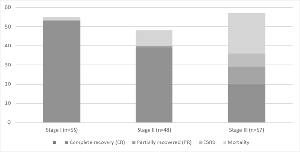Clinical Audit of Acute Kidney Injury in Critically Ill Obstetric Patients
Authors
##plugins.themes.bootstrap3.article.main##
Abstract
Background: Pregnancy-related acute kidney injury (PRAKI) has a bimodal distribution. Study aimed to analyze epidemiological factors causing AKI in critically ill obstetric women and required early interventions. Materials and Methods: The study was conducted in an Obstetrics intensive care unit over a year. Total 447 obstetric patients admitted in critical care unit were recruited, 162 critically ill women who developed AKI were enrolled and followed for 3 months for renal outcome, AKI defined as per KDIGO guidelines. Data was collected through a structured questionnaire, medical records, and daily follow-ups until discharge. Analyses included ABG, complete blood count, serum urea, creatinine, PT/INR, and electrolytes. Critical illness was evaluated using the APACHE II score. Results: AKI incidence was 36.2%, hypertensive pregnancy disorders being the major cause (50.6%). Sepsis was most common mortality factor (27.16%), followed by hemorrhage (20.73%). 19.4% women died. Those patients who developed AKI, 70% recovered completely, 6.4% partially, 4.4% progressed to end stage renal disease. 71.6% cases of AKI were of antenatal. After 3 months of follow up, complete recovery significantly higher in Stage I AKI (96.4%) and Stage-II (81.3%) while rate of partial recovery and deaths were higher in Stage III AKI vs stage II (36.8%&15.8%). Higher APACHE II score (19.72±5.00) was associated with stage III AKI. Duration of ICU stay (4.56±4.82), duration of intubation (3.74±5.31) and requirement of vasopressor support significantly associated with adverse outcome. Conclusion: Higher stages of acute kidney injury (AKI) resulted in higher mortality, morbidity, APACHE II score, intervention and intubation requirements, and ICU stay.
##plugins.themes.bootstrap3.article.details##
Copyright (c) 2025 Rekha Sachan, Himani Singh, Munna Lal Patel, Radhey Shyam

This work is licensed under a Creative Commons Attribution 4.0 International License.
Creative Commons License All articles published in Annals of Medicine and Medical Sciences are licensed under a Creative Commons Attribution 4.0 International License.
Rekha Sachan, Professor, Department of Obstetrics and Gynaecolgoy, King George Medical University Lucknow, Uttar Pradesh, India.
Professor, Department of Obstetrics and Gynaecolgoy, King George Medical University Lucknow, Uttar Pradesh, India.
Himani Singh, Senior Resident, Department of Obstetrics & Gynaecology, King George Medical University, Lucknow, Uttar Pradesh, India.
Senior Resident, Department of Obstetrics & Gynaecology, King George Medical University, Lucknow, Uttar Pradesh, India.
Munna Lal Patel, Professor, Department of Medicine, King George Medical University Lucknow, Uttar Pradesh, India.
Professor, Department of Medicine, King George Medical University Lucknow, Uttar Pradesh, India.
Radhey Shyam, Additioanl Professor, Department of Geriatric Mental Health, King George Medical University Lucknow, Uttar Pradesh, India.
Additioanl Professor, Department of Geriatric Mental Health, King George Medical University Lucknow, Uttar Pradesh, India.
[1] Okamoto TY, Dias JCY, Taguti P, Sacon MF, Kauss IAM, Carrilho CMDM, et al. Acute renal injury in patients with severe sepsis: prognostic factors. Sci Med (Porto Alegre) 2012;22:138-41.
[2] Selcuk NY, Onbul HZ, San A, Odabas AR. Changes in frequency and etiology of acute renal failure in pregnancy (1980- 1997). Ren Fail. 1998;20(3):513-517.
[3] Prakash J, Niwas SS, Parekh A, Pandey LK, Sharatchandra L, Arora P, Mahapatra AK. Acute kidney injury in late pregnancy in developing countries. Ren Fail 2010;32:309–313.
[4] Vasquez DN, Estenssoro E, Canales HS, et al. Clinical characteristics and outcomes of obstetric patients requiring ICU admission. Chest. 2007;131(3):718-724.
[5] Gatt S. Pregnancy, delivery and the intensive care unit: need, outcome and management. Curr Opin Anaesthesiol. 2003;16(3): 263-267.
[6] Wiles K, Bramham K, Seed PT, Nelson-Piercy C, Lightstone L, Chappell LC. Serum Creatinine in Pregnancy: A Systematic Review. Kidney International Reports. 2019 Mar;4(3):408–19.
[7] Khwaja A. KDIGO Clinical Practice Guidelines for Acute Kidney Injury. Nephron. 2012 Aug 7;120(4):c179–84.
[8] Mahesh E, Puri S, Varma V, Madhyastha PR, Bande S, Gurudev KC. Pregnancy-related acute kidney injury: An analysis of 165 cases. Indian J Nephrol. 2017 Mar-Apr;27(2):113-117.
[9] Patel ML, Sachan R, Radheshyam, Sachan P. Acute renal failure in pregnancy: Tertiary centre experience from north Indian population. Niger Med J 2013;54:191-5.
[10] Najar MS, Shah AR, Wani IA, Reshi AR, Banday KA, Bhat MA, et al. Pregnancy related acute kidney injury: A single center experience from the Kashmir Valley. Indian J Nephrol 2008;18:159-61.
[11] Sachan R, Shukla S, Shyam R, Patel ML, Verma ML. Role of renal replacement therapy in pregnancy related acute kidney injury and its outcome. J Family Med Prim Care 2022;11:2155-61
[12] Gautam, Medhavi & Saxena, Sulekha & Saran, Sai & Ahmed, Armin & Pandey, Amita & Mishra, Prabhakar & Azim, Afzal.. Etiology of Pregnancy related Acute Kidney Injury among Obstetric Patients in India: A Systematic Review. Indian Journal of Critical Care Medicine. 2022;26: 1141-1151.
[13] Goplani KR, Shah PR, Gera DN, Gumber M, Dabhi M, Feroz A, Kanodia K, Suresh S, Vanikar AV, Trivedi HL. Pregnancy-related acute renal failure: A single-center experience. Indian J Nephrol. 2008 Jan;18(1):17-21.
[14] Kumar SK, Krishna CR, Kumar VS. Pregnancy related acute renal failure. J Obstet Gynaecol India 2006;56:308-10.
[15] Vinturache A, Popoola J, Watt-Coote I. The Changing Landscape of Acute Kidney Injury in Pregnancy from an Obstetrics Perspective. J Clin Med. 2019 Sep 6;8(9):1396.
[16] Sandilya S, Rani KU, Kumar R. Risk factors and fetomaternal outcome in pregnancy-related acute kidney injury. J Family Med Prim Care 2023; 12:3346 50.
[17] Kattah A. Preeclampsia and Kidney Disease: Deciphering Cause and Effect. Curr Hypertens Rep. 2020 Sep 14;22(11):91.
[18] Peerapornratana S, Manrique-Caballero CL, Gómez H, Kellum JA. Acute kidney injury from sepsis: current concepts, epidemiology, pathophysiology, prevention and treatment. Kidney Int. 2019 Nov;96(5):1083-1099.
[19] Seabra VF, Balk EM, Liangos O, Sosa MA, Cendoroglo M, Jaber BL. Timing of renal replacement therapy initiation in acute renal failure: A meta-analysis. Am J Kidney Dis 2008; 52:272-84.
[20] Taber-Hight E, Shah S. Acute Kidney Injury in Pregnancy. Adv Chronic Kidney Dis. 2020 Nov;27(6):455-460.

